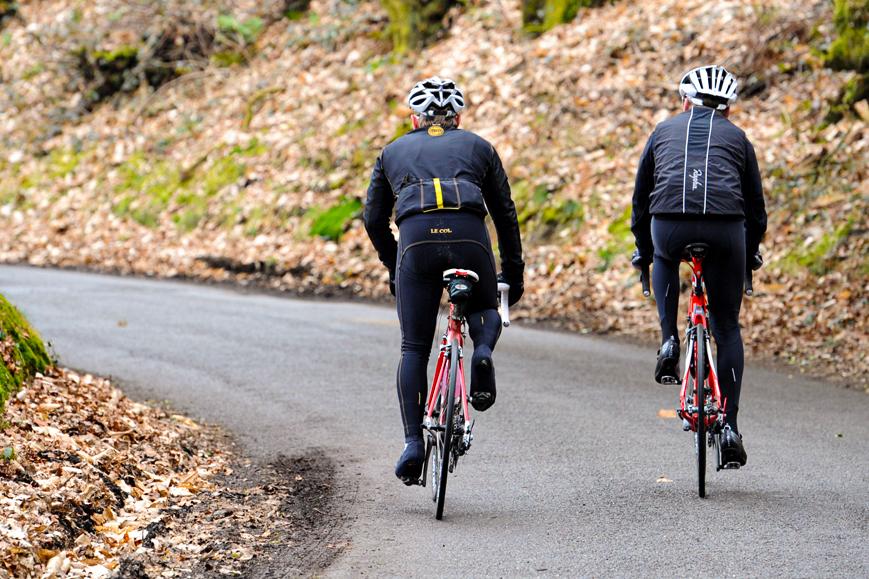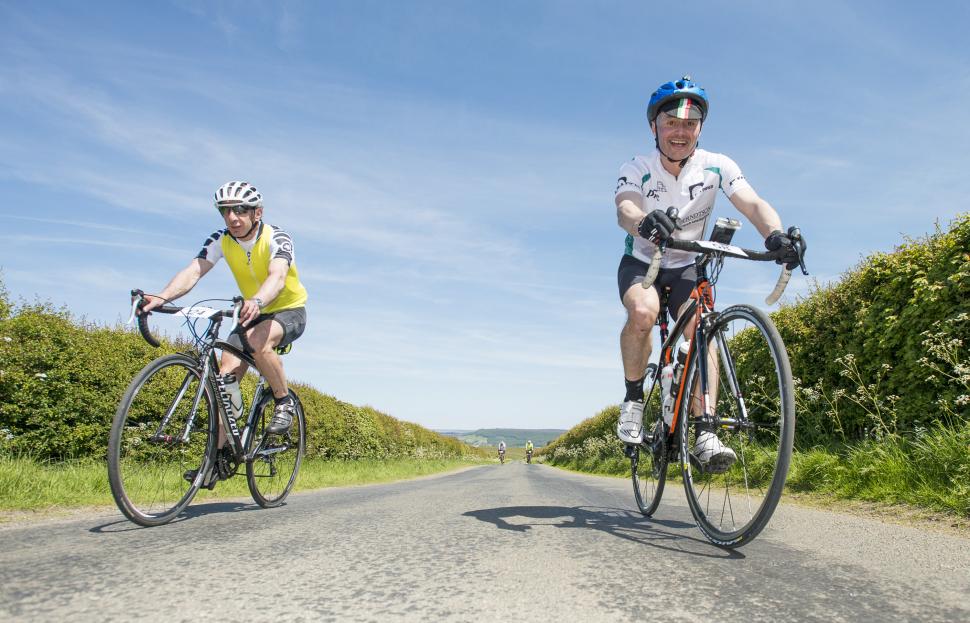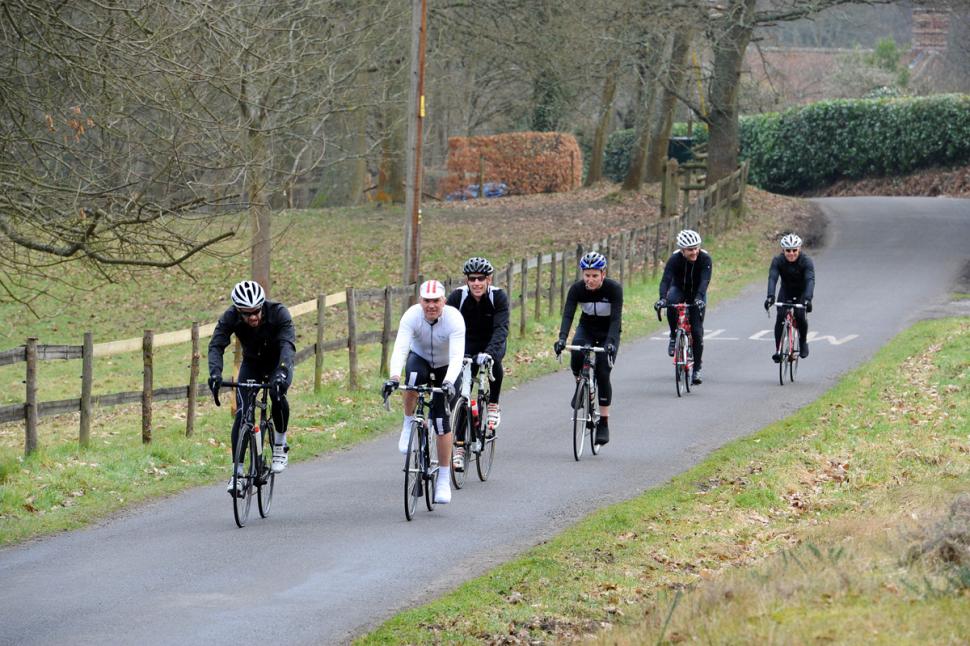- News
- Reviews
- Bikes
- Components
- Bar tape & grips
- Bottom brackets
- Brake & gear cables
- Brake & STI levers
- Brake pads & spares
- Brakes
- Cassettes & freewheels
- Chains
- Chainsets & chainrings
- Derailleurs - front
- Derailleurs - rear
- Forks
- Gear levers & shifters
- Groupsets
- Handlebars & extensions
- Headsets
- Hubs
- Inner tubes
- Pedals
- Quick releases & skewers
- Saddles
- Seatposts
- Stems
- Wheels
- Tyres
- Tubeless valves
- Accessories
- Accessories - misc
- Computer mounts
- Bags
- Bar ends
- Bike bags & cases
- Bottle cages
- Bottles
- Cameras
- Car racks
- Child seats
- Computers
- Glasses
- GPS units
- Helmets
- Lights - front
- Lights - rear
- Lights - sets
- Locks
- Mirrors
- Mudguards
- Racks
- Pumps & CO2 inflators
- Puncture kits
- Reflectives
- Smart watches
- Stands and racks
- Trailers
- Clothing
- Health, fitness and nutrition
- Tools and workshop
- Miscellaneous
- Buyers Guides
- Features
- Forum
- Recommends
- Podcast
feature
 Southern-Spring-Sportive-2012-08-full size-2
Southern-Spring-Sportive-2012-08-full size-2Cycling Health Q&A: Prostate problems – time to talk about men’s health
Men may be notoriously reticent to talk about their health, and even more so when it concerns the more personal areas of the body. But when it comes to cycling, people often infer an association between time in the saddle and prostate or urological issues.
To cut a long story short... this association is largely false. As Mr Christian Brown - consultant urological surgeon at London’s King's College Hospital and The Prostate Centre (and a keen cyclist) - explains in much greater depth below, there is no known link between cycling and prostate cancer, and cycling won't actually cause major prostate problems either.
As Sir Chris Hoy bravely revealed his Stage 4 prostate cancer diagnosis, he also explained how cycling helped him to keep fit and stay positive through brutal rounds of chemotherapy in early 2024, claiming to have only missed five days of riding during the treatments.
We'll leave it to Mr Brown to tell us the truth about the link between cycling and men’s health.
road.cc: First of all, the big question: does cycling affect the risk of prostate cancer?
Christian Brown: Some years ago there was an article published that said the risk of prostate cancer in men who cycled regularly was higher than in those men who didn’t cycle regularly. However, this was bounced around a bit among my profession and it was essentially debunked. Cycling doesn’t cause prostate cancer.
However, the cohort of men that this article looked at - who cycled three times a week or who cycled more than 50km every week - did have a higher incidence of prostate cancer than men who didn’t cycle. We see these kinds of associations from time to time in medicine but there is no scientific link between cycling and prostate cancer.
In this study, the men who exercised regularly were more likely to go to a doctor to ask the question: ‘Am I alright?’ and then a small proportion had early curable cancer diagnosed. So we have to be careful about cause and association.
It’s interesting to note that in the same cohort, researchers also looked at infertility and erectile dysfunction and there was definitely no association between those issues and cycling.
So does cycling have any effect on prostate health?
In this case, I think you have to say yes. If you’ve got a tendency for any chronic issue with the prostate - particularly chronic pelvic pain syndromes and things like that - then the cycling position over the span of a long ride is not helpful. However, you can go some way to reduce it with effective padded saddles and shorts.
I think it’s also worthwhile explicitly saying that cycling has many more benefits than detrimental aspects to it, and cycling doesn’t actually cause these issues, but it can exacerbate them.
For instance, if you’re 55 or 60 years old and you have an enlarged prostate, riding your bike every weekend is not going to make that any bigger or smaller or cause you any more problems. But if you’re a young guy who gets a bit of prostatitis - or chronic pelvic pain syndrome as we call it now - then cycling can make it worse.
In my experience, some of these young guys who are keen on triathlons and do a lot of ultras and very long rides often say they really feel prostate pain the day after a big training session. But they live with it and it goes away, so it’s not debilitating.
Because of that slightly different nature of sitting on a saddle compared to a chair, can cycling highlight any early warnings of a prostate problem?
Not really, but the message to any man would be: whether you develop a new symptom cycling, or a new symptom sitting down or walking or wherever, you need to get it checked out.
Where cycling might help is that sometimes, when we’re doing things alone, we often think about things that we wouldn’t have chance to think about during normal busy daily life. So that’s when you might notice that something feels a little bit different.
As a general men’s health message, it’s noticing change that’s important. If something feels different compared with how it used to, then it’s worthwhile talking to your GP or a urologist about it, just in case it ends up being significant.
What specific symptoms should men be looking out for?
Generally, a change in the way you feel. The prostate is described as being felt deep inside the pelvis, around the anus, base of the penis, and in the perineum. That clearly is an area that really takes a battering with long cycle rides but if you develop a change of feeling there, you ought to get it checked out.
The other issue is change in the way that you pass urine. If you’re urinating more frequently day or night, or it’s becoming more difficult to pass urine, then that needs getting checked out, including passing blood of course.
How important are things like shorts and saddles?
They’re absolutely critical. I think that for anyone who is going to cycle regularly, having a good saddle and pair of shorts is as important as having a good pair of trainers if you’re a runner. You wouldn’t go running in a pair of Dunlop Greenflash because you know you’re going to get back pain, knee pain and everything else.
Of all the cycling kit that people have, a decent pair of padded shorts and a gentleman-friendly saddle – of which any bike shop will stock various brands and types – is really, really critical.
As a keen cyclist yourself, do you approach the way you cycle differently because of your knowledge of these issues?
That’s a bit difficult to say because I’ve cycled for such a long time. I remember buying a pair of padded shorts at university when I was 18 and commuting in London as a medical student, and thinking they were fantastic. I couldn’t believe I hadn’t bought any before. So I’ve worn padded shorts all my cycling life.
But one thing I do think is important is that I’ve replaced my shorts regularly. That’s a critical thing – your kit does need changing and updating. When you’ve had a pair of shorts for two or three years and you’ve worn them regularly, they lose their ability to protect you. With multiple washes, getting wet, and the repetitive absorbing of impacts - again it’s just like a pair of trainers - you’ve got to move on and change them from time to time. I don’t have any allegiance to any brands, but I do think you get what you pay for.
We always think of prostate cancer as being the big issue when it comes to prostate problems, but what other conditions are there?
Benign prostate enlargement is as common as grey hair and balding and is associated with age. Almost all men get benign enlargement issues that can cause voiding problems, such as straining, going to the toilet more frequently, poor flow and sometimes dribbling. Getting up at night is a key symptom.
Then there are prostate infections and prostate inflammatory conditions such as prostatitis and chronic pelvic pain syndrome. Some people can just have a painful prostate – perhaps after surgery, after an infection, sometimes it can arise just out of the blue. That’s where I think long bike rides can really exacerbate it, and I think that’s due to position and perineal vibration.
You’ve mentioned position a couple of times – how important is it?
Position is key and one of the things that’s relatively new to me – I’ve never been very techy with my own cycling, I’ve just enjoyed it – but friends of mine have been talking about bike fitting for years.
If you’ve got a tendency for any kind of orthopaedic problem or, in this case, a prostate problem, then having a bike fitting so that you are ergonomically right on the bike is very helpful. If you struggle with pelvic or perineal pain after riding, it might be worth having a fitting or addressing your cycling position just to see if it can optimised in any way.
For cyclists who have had prostate surgery, how quickly and how easily can they get back on a bike?
There are different types of prostate surgery but the general principle is, if you’ve had any type of pelvic operation or any type of prostate operation, it can be difficult and painful to get back in the saddle. The advice we always give is to leave it a good four to six weeks, let everything settle down and then go for a short trial ride near your home so you can get back easily.
There are no two ways about it, after prostate surgery you do need some time off the perineal pressure and agitation that you get with the vibrations in the saddle.
And when it comes to long-term health, you obviously feel the health benefits of cycling counteract any risks?
Absolutely. By keeping healthy, avoiding obesity, raising your metabolic rate – all things that cycling does – there are countless positive effects for mind, body and soul and it far outweighs any other consideration.
In the case of prostate cancer, there is a very clear and critical link between obesity and developing prostate cancer, and the metabolism of cancer cells in the obese is very different to those who aren’t obese. So not only do obese men have a higher incidence of prostate cancer, but if they get it, they tend to get a more aggressive version. That’s very clear in the literature and well understood.
Obesity is a risk factor in pretty much every disease – there are no wins with obesity, there is nothing it protects you from, it only causes problems. Cycling is a very good way to avoid obesity and, of course, it also reduces your blood pressure and it reduces your risk of diabetes, which are risk factors for cardiovascular disease and other illnesses.
The truth about prostate cancer
road.cc We often hear that prostate cancer is something you die with, rather than die of. Is that incorrect?
Not necessarily. If you’re 45 and you’ve been diagnosed with an aggressive prostate cancer, you’re definitely not going to survive that unless we do something about it. However, if you’re 85 and a small amount of prostate cancer is found, you are probably going to live with it and will not die because of it. Clearly I am talking extremes here to highlight a point.
In every case, the earlier you know about it the better because it gives you options. One of those options could be monitoring or, if it’s aggressive, then it’ll be surgery, radiation or chemotherapy. It all depends on where you are in the spectrum of the disease, how advanced it is and where it is in your body.
We are seeing prostate cancer in lots of people under the age of 50 and, of course, life expectancy for healthy men is 80 to 90 on average these days and is going up all the time. So we do intervene a lot earlier so these men can lead a full and healthy life free of cancer.
What factors play a role in developing prostate cancer?
Genetics play a huge part. Although prostate cancer is very common, it does cluster in families. If you have prostate cancer in a first-degree relative – a brother or father – then it does increase your risk by about 20%, and particularly if they have had prostate cancer diagnosed before the age of 60.
If your father was diagnosed with prostate cancer at 55 and you’re 40 and you’re wondering if you should be tested, I’d say yes, have a test. If your father had prostate cancer at 85 it’s probably not so important to be tested.
One thing that a lot of people don’t know is that some of the same genes that cause prostate cancer are shared with breast cancer. If you have a mother or sister with breast cancer, it does increase your risk of prostate cancer. So you can actually inherit a gene from your mother that increases your risk of a male cancer.
For advice on prostate problems, you can visit this page on the NHS website. You can also check for symptoms of prostate cancer here, and find more information on the Prostate Cancer UK website. If you have noticed any unusual or worrying symptoms, contact your GP as soon as possible.
Latest Comments
- brooksby 26 min 22 sec ago
WHY did this bloke throw a full water bottle at VDP? Who goes to a major sporting event and thinks to themself, "You know what - I think I'll try...
- Dnnnnnn 36 min 14 sec ago
"With the six-month review of the scheme now approaching"... LOL. The scheme they prevented implementation of for almost six months....
- mark1a 38 min 11 sec ago
Do you by any chance get these options on the discovery+ screen? I get TNT via Sky (i.e. I get billed by Sky as part of TV/broadband/phone/etc...
- Rendel Harris 48 min 52 sec ago
Especially as apparently his Di2 managed to mistake the shaking from the cobbles of the Arenberg as a crash and went into crash mode, locking him...
- wtjs 51 min 15 sec ago
APPGs (not just this one) are pretty low down the influence ladder...
- Gus T 1 hour 30 min ago
Don't forget that the Tariffs will still apply to the imported raw materials and parts so are of no benefit to the US consumer. Americas burns...
- Gus T 1 hour 38 min ago
My wife & I visited Bristol for the 1st time a couple of weeks ago, I was amazed at the congestion caused by the number of single occupancy...
- hawkinspeter 2 hours 17 min ago
https://www.bristolpost.co.uk/news/bristol-news/live-bus-crashes-bridge-bristol-10103689 That bridge really needs some hi-viz
- Rendel Harris 2 hours 43 min ago
"However, one passenger on the bus at the time of the collision, Victoria Lester, who was sitting "right behind the bus doors" reported Lucas's...




Add new comment
19 comments
Was this a "sponserd by the cycling industry" article as it's absolutely biased, based on his own opinions and ignores reams of publically availabe data amassed over decades based upon 'real' amateur riders (not young Pro's), where a definite link between the over 50's, riding more than (I forget precisely)8 hrs/week using 'most' current racing-style bicycle saddles and prostrate problems (not all being cancer) was established.
The bicycle industry, and especially saddle manufacturers, are well aware of this but profit-before-safety (and avoiding massive class-action law suites) has proven more important. Just look at the age demographic who actually buy expensive bikes instead of a golf club membership. Playing golf doesn't give you enhanced risk of prostrate cancer I believe.
I was diagnosed at 50+ with prostrate cancer after 20 years as a keen amaeur club racer. No prior history whatsoever in my family.
I informed multiple cycling club friends, all over 50, with no family history of prostrate problems either, but after I recommended a PSA (prostrate specific antigen) test, many had elevated levels and took appropriate action. Monitoring regularly is the key.
Bike sadlle design is one of the cycling industries' dirty-little-secrets and it's high time it was exposed. Tobacco in the 50's and 60's and the oil industry currently were or still are doing the same smoke-and-mirrors coverup job on unsuspecting individuals; Using so-called experts to say misleading things about their harmful products.
I find it quite extraordinary that you are so exercised about this issue and have had this type of cancer yourself and yet you still think it's spelled "prostrate cancer".
I suspect you're misreading the data, if you're referring to the journal of Men's Health study of 2014 by Hollingworth, Harper and Hamer: yes, they did find the risk for riders riding more than 8.5 hours per week was an astonishing six times that of riders doing 3.5 hours per week or less, but before anyone panics they also found that for both groups the risk was lower than for the non-cycling population.
Rather than just make unfounded assertions, do you have any peer-reviewed studies showing that male cyclists are more likely to have prostate cancer than non-cyclists? I can't find any.
I'm not (quite) 50 yet, but I definitely have prostrate problems after a long ride - once I lie down I struggle to get back up again.
I'm not (quite) 50 yet, but I definitely have prostrate problems after a long ride - once I lie down I struggle to get back up again.
[/quote]
I'm 54 and three quarters and I have that problem whether I've been riding a bike or not.
Great article. Informative, clear, and concise answers prompted by thoughful questions.
I don't think there's a single 'prostrate' in this article, which is rare. Very good, as you would expect from a modern consultant urologist. Summary- prostate cancer nothing to do with cycling.
Never take inaccuracies like that lying down.
...or avoid the whole issue by doing so?
Thank you, Road.cc, for publishing this article.
I'm a 65-year-old cyclist who had radical prostatectomy (complete removal of the prostate) surgery, including removal of 12 lymph nodes, on 1 July 2020. My surgeon asked me not to cycle for one month, so I did not climb back upon my beloved bicycle on 1 August. Since then, I've cycled over 3,000 KM. Here is my Prostate Cancer Recovery Diary, in which I talk about cycling to heal: https://www.youtube.com/channel/UCsyukWkl2q7G18PA_yyo2Lg
John
Interesting and useful - more of this sort of thing please.
Didn't realise there was a link between breast cancer and prostate cancer for example. Have a strong lineage on the former (3 and probably 4 generations on the maternal side) and had a lump checked out (yes, blokes can get it too) a couple of years ago. Turned out to be benign.
Being 50+ and overweight I have a BEP. It's a hassle but nothing more - and you can do a lot to meditate it away/ignore the feeling of urgency.
I would hasten to add that if you have a family history of prostate cancer, as mentioned above, then I would recommend being tested from the age of 40 onwards. Even if its simply once a year which establishes a base line.
I developed it at the age of 42 and know people who have died from contracting it at a similar age. The death rate of prostate cancer in younger men, is quite high, simply because no one is either considering it, nor looking for it.
The main test is currently the PSA test which is a simple blood test. Everyone seems to think that it is the dreaded DRE (digit rectrum exam), but believe me when I say, its the last thing a doctor wants to be doing to you.
I implore anyone who has a gut feeling or is worried, to get a test completed, I'm only here because I went against doctors advice and demanded a test.
Feel free to correct me if I am wrong but I was led to believe by my doctor that the PSA test is notoriously unreliable and can lead to an invasive procedure that has a high chance of unwarranted negative effects. The upshot being that GPs advise against the PSA test.
https://phescreening.blog.gov.uk/2016/03/29/updated-guidance-for-gps-on-...
Fun fact - 75% of men over 75 die WITH prostrate cancer but only 14% of men die OF prostrate cancer.
Think you have quoted slightly out of context based on that article. My interpretation - Its not reliable enough to be used as part of a general screening program, regardless of risk category or lack of underlying symptoms.
If you have symptoms or are in a high risk category its a valid thing to do.
That would be older advice as the testing now will involve an MRI, I've been "fortunate" to experience both approaches since my first PSA test with a high reading. First bout was 2 types of biopsy, one under general anaesthetic where cancerous cells were discovered but may well have removed all of them.
Second time around 2 raised PSA results and an MRI later no problems discovered but no biopsies required.
Had the same conversation with my GP and consultant only last week. The potential for invasive interventions , leading to infection issues, and less than a satisfactory outcome has to be well thought through.
An excellent article in Road CC though and well worth the read, if only to assuage the common myths re cycling being the cause of plumbing issues in men.
Thanks for sharing, your personal experience gives far more context than any article. If it helps save one life then you have done a great job.
https://www.bmj.com/content/362/bmj.k3581
Good find.
Interesting footnote.
"This guideline makes a weak recommendation against offering systematic PSA screening based on an updated systematic review. The recommendation is weak because there may be a small, though uncertain, benefit of screening on prostate cancer mortality"
Bottom line is that if you are in the majority that gets late life -"mild" prostate cancer its unlikely to kill you as its usually very slow growing. If you are in certain risk groups that bet is off.
.
'Bottom line'.
.
Love it, love it!
.
Nice one!
.